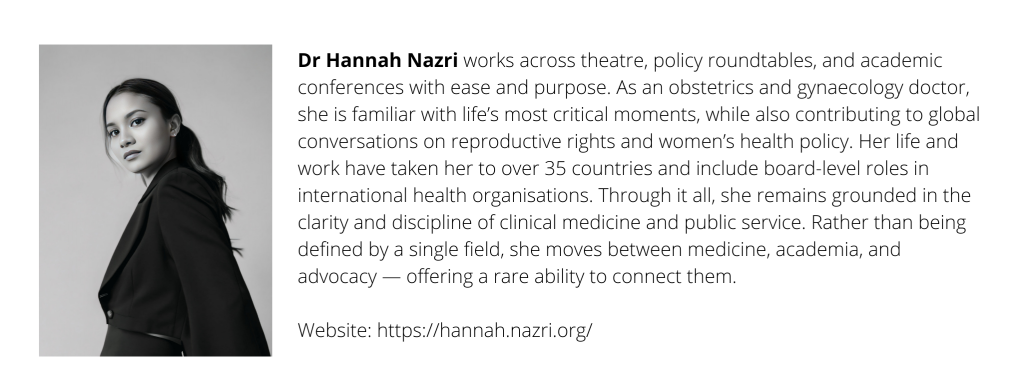First published on Asia Europe Foundation Education Blog here.
The 3rd ASEF Young Leaders Summit (ASEFYLS3) took place from 15 to 19 November 2018 in Brussels, Belgium, under the theme “Ethical Leadership”. It was held in conjunction with the 12th Asia-Europe Meeting (ASEM) Summit. Participants were challenged to explored ethic leadership in 10 different domains, e.g. Education, Politics and Sports. Science & Technology is also a very prevalent topic as we constantly seek out technological solutions to global issues without carefully examining the negative consequences. In this light, Dr Hannah NAZRI, a participant from Malaysia, chose to share with us the ethical concerns which accompany the usage of technology in the healthcare industry.
Vaccine hesitancy is one of the most pressing health issues of our times. The World Health Organisation (WHO) named vaccine hesitancy as one of the 2019 world’s top threats to global health¹. Measles, for example, has seen a 30% increase in reported cases globally since Andrew Wakefield’s, now retracted, Lancet paper linked the MMR (Mumps, Measles, and Rubella) vaccine to autism. Recently, along with 4 other European countries, the UK has lost its WHO measles-free status² owing to the growth of anti-vaccination groups who spread dissent and misinformation.
Common reasons for vaccine hesitancy include the idea that better sanitation and hygiene precludes the need for vaccination, the assumption that children need not be vaccinated because the majority of people have been vaccinated or vaccine-preventable diseases have been eliminated, and the fear of side-effects and overloading their child’s immune system with multiple vaccinations. But of course, cultural and religion-specific reasons do also come into play; MMR vaccination rates plummeted when a fatwa (a nonbinding legal opinion on a point of Islamic law) released by the Indonesian Ulama Council of Riau Island³ asserted that MMR vaccines contained pork elements, deeming it haram (i.e. forbidden for Muslims). In Malaysia, 11.6% of parents are vaccine-hesitant with the internet as the main source of information on vaccines⁴.
Media platforms, including social media, have been crucial in propagating vaccine hesitancy and other health misinformation.
A plethora of fad diets, anti-GMO movements, homeopathy, or certain health fads (e.g. urine treatment) in lieu of conventional medical treatments, have found their fanbase in Facebook groups. Gwyneth Paltrow, a celebrity, was infamous for selling “vaginal jade eggs” through her health-based company “Goop”. These “eggs” purportedly help to balance menstrual cycles, improve sex life and “intensify female energy”. Although this sounds ridiculous and unscientific, some women prefer to believe in the mystical and mythical powers of a rock than doing Kegel exercises. Of course, the unsexy risk of toxic shock syndrome that these “eggs” pose is discounted⁵.
In the Malaysian landscape, in a bid to becoming a cosmetic millionaire in the quickest way possible, many cosmetic founders invest in creams sold in tubs by the kilogramme, which are then repackaged and rebranded to be sold in the market or increasingly, over Instagram and Facebook. Many of these cosmetic products were found to have toxic substances⁶ such as mercury⁷, hydrocortisone or hydroquinone⁸ as active ingredients, posing a health risk to the public. Perhaps, people are becoming impatient; conventional medical advice has become all too boring and tedious, and the lure of a miraculous transformation, as advertised by one’s favourite social influencer or celebrity, seems much more appealing than seeing a dermatologist or putting in the work for Kegels.
But increasingly, it is not surprising why the public can be more prone to believing these pseudoscience assertions. People are becoming desperate with the limited progress of their recovery from illness, and the progress in diagnostic and therapeutic research of these many diseased conditions has been unsatisfactory. Conventional medicine is not giving them the answers that they want to hear, while doctors can be unsympathetic and cold. Women, especially, have a long history of being dismissed by doctors. In the past, when doctors had been confounded with an ill woman, they would diagnose her with “hysteria”⁹. Now, doctors say “it is all just psychogenic” and diagnose women with depression¹⁰. This is especially so with many gynaecological conditions (e.g. endometriosis) and chronic conditions (e.g. fibromyalgia) where the majority of the patients are women and not much is known about such conditions. In a study exploring the gender disparity in medical treatment of abdominal pain in the emergency department¹¹, they found that women are more likely to be denied painkillers and have their pain attributed to their psychology as compared to men. It is then not surprising that many women would prefer to seek medical advice online from a sympathetic group (e.g. Facebook groups) to seeing a General Practitioner.
These secret or private Facebook groups can be a great source of comfort and camaraderie to these women, but they may be doling out dangerous health advice, such as advising parents to cure their children’s autism with bleach¹².
Scientific journals have become more accessible to the public, which has led to misinterpretation or “cherry picking”, often touted as evidence for some of these pseudoscience practices in these Facebook groups. The “publish or perish” culture in science has led to the proliferation of predatory scientific journals, many of which do not have the check and balances of a legitimate peer-reviewed journal. This is not something the public may be aware of when presented with a paper from these journals. However, legitimate journals do make mistakes too, as with the Lancet and Andrew Wakefield’s paper.
Another example is the now retracted case study by Andolina at the Stamina Foundation, which published in the International Journal of Stem Cells in 2014. It was about a boy with a neurodegenerative disease who had been injected with stem cells from his father without any figures, detailed methods, or supplementary information to support the author’s assertions that the boy got better. Indeed, the medically unproven stem cell therapy has become a $2 billion global industry¹³. Other than for blood disorders, there is no clinical evidence on the effectiveness of stem cell therapies for other diseased conditions.
Yet, many medical professionals participate in this pseudoscience debauchery — especially in the fast-growing wellness and aesthetics industries — which begs the question, who should the public believe?
The public should be equipped with the scientific literacy skills to sieve through the amount of misinformation that is present today.
I echo Daniel Sokol, a medical ethicist and barrister in his BMJ article, on his view that “doctors should stay clear of wellness ventures”¹⁴. I would also suggest that they refrain from airing their opinions on new research and endorsing new medical devices, treatments and techniques without extensive inquiry and consulting various experts, especially in areas where evidence is contentious, or in areas where they are not the authority. New does not mean better. Perhaps, some of these practices may not pose long-term health risks. However, where are your morals if you allow your patients to pay an unreasonable amount for an intravenous infusion of vitamin C despite knowing the beauty effect is just a placebo? It is unquestionably unethical to provide unsafe and/or unproven treatments, and this goes against the Hippocratic Oath – an ancient oath of ethics that is still held sacred by physicians.
Today, doctors have a greater role as empathetic listeners in order to gain their patients’ trust, allowing them to better educate others about health concerns. They also have to become social media savvy public engagers to counter the health misinformation online. Importantly, the professional development of a doctor should include developing leadership skills not only pertaining to clinical leadership. Doctors should no longer live in their medical silos but must take interest in both public health and non-medical issues. This way, they can be efficient and ethical advocates for patients on the ground and beyond the hospital gates.
Dr Hannah NAZRI is an alumna of the 3rd ASEF Young Leaders Summit (ASEFYLS3). She is a medical doctor and DPhil candidate at the University of Oxford with a focus on endometriosis at the Nuffield Department of Women’s & Reproductive Health. She has previously earned medical degrees at University of Bristol, University College London, and University of Oxford. Dr NAZRI is also the Chair of the Board of Trustees of The Kalsom Movement and a Finalist of the 2015 Queen’s Young Leaders Award, earning her the Associate Fellowship of the Royal commonwealth Society.
Related posts:
- Countering Everyday Extremism Against Women: The Other Pandemic
- In The Pursuit Of A Great Education And Career | Phenotype, Issue 32 Hilary Term 2019
Like what you read? Subscribe to my blog.
References
- Ten health issues WHO will tackle this year. Who.int. https://www.who.int/emergencies/ten-threats-to-global-health-in-2019. Accessed July 30, 2020.
- Measles returns to four European nations, WHO says. BBC News. https://www.bbc.co.uk/news/health-49507253. Published 2019. Accessed July 30, 2020.
- Rochmyaningsih D. Indonesian ‘vaccine fatwa’ sends measles immunization rates plummeting. Science | AAAS. https://www.sciencemag.org/news/2018/11/indonesian-vaccine-fatwa-sends-measles-immunization-rates-plummeting. Published 2018. Accessed July 30, 2020.
- Mohd Azizi F, Kew Y, Moy F. Vaccine hesitancy among parents in a multi-ethnic country, Malaysia. Vaccine. 2017;35(22):2955-2961. doi:10.1016/j.vaccine.2017.04.010
- 5. Thomason K. Why You Should Never Put Jade Eggs in Your Vagina. Health.com. https://www.health.com/sexual-health/jade-egg-goop. Published 2018. Accessed July 30, 2020.
- Chua K, Guo Y. These Cosmetic Millionaires Are Selling Poison. JUNK ASIA. https://junkasia.com/2018/03/26/meet-malaysias-cosmetic-millionaires/. Published 2018. Accessed July 30, 2020.
- Mercury-Added Skin-Lightening Creams: Available, inexpensive and toxic – EEB – The European Environmental Bureau. EEB – The European Environmental Bureau. https://eeb.org/library/mercury-added-skin-lightening-creams-available-inexpensive-and-toxic/. Published 2018. Accessed July 30, 2020.
- Abas A. Health Ministry bans 14 poisonous skincare products | New Straits Times. NST Online. https://www.nst.com.my/news/nation/2018/10/419376/health-ministry-bans-14-poisonous-skincare-products. Published 2018. Accessed July 30, 2020.
- Maines R. The Technology Of Orgasm. Baltimore: Johns Hopkins University Press; 2010.
- Dusenbery M. Doing Harm: The Truth About How Bad Medicine And Lazy Science Leave Women Dismissed, Misdiagnosed, And Sick. New York, NY: HarperOne, an imprint of HarperCollinsPublishing; 2018.
- Chen E, Shofer F, Dean A et al. Gender Disparity in Analgesic Treatment of Emergency Department Patients with Acute Abdominal Pain. Academic Emergency Medicine. 2008;15(5):414-418. doi:10.1111/j.1553-2712.2008.00100.x
- Zadrozny B. Parents are poisoning their children with bleach to ‘cure’ autism. These moms are trying to stop it. NBC News. https://www.nbcnews.com/tech/internet/moms-go-undercover-fight-fake-autism-cures-private-facebook-groups-n1007871. Published 2019. Accessed July 30, 2020.
- 13. Piuzzi N, Dominici M, Long M et al. Proceedings of the signature series symposium “cellular therapies for orthopaedics and musculoskeletal disease proven and unproven therapies—promise, facts and fantasy,” International Society for Cellular Therapies, Montreal, Canada, May 2, 2018. Cytotherapy. 2018;20(11):1381-1400. doi:10.1016/j.jcyt.2018.09.001
- Sokol D. The drip, drip, drip of the profit motive. BMJ. 2019:l4692. doi:10.1136/bmj.l4692
About the Author: Hannah Nazri



These are actually great ideas in concerning blogging.